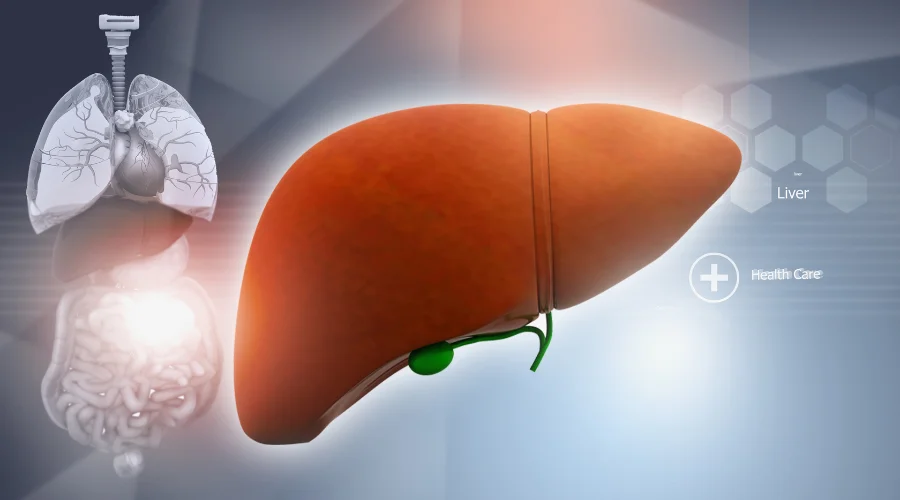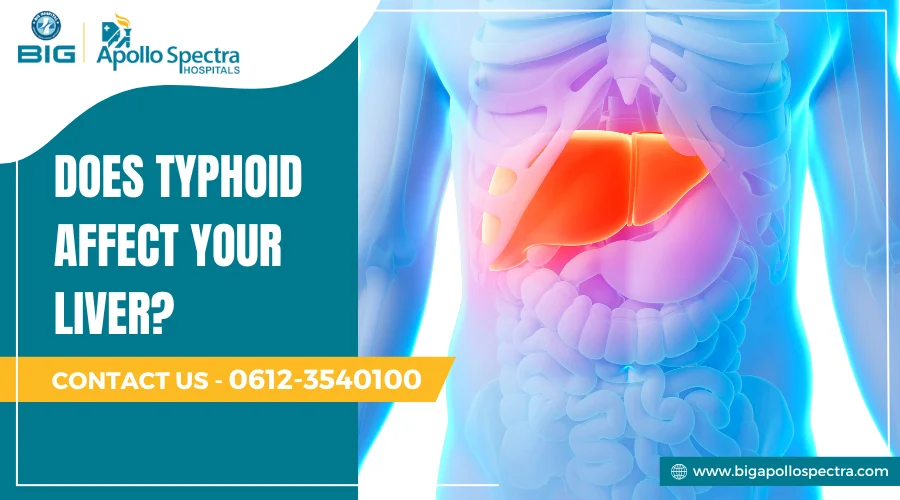Typhoid fever is a serious bacterial infection caused by Salmonella Typhi, and it can also be life threatening as a consequence. The systemic disease spreads via contaminated food and water sources in areas where sanitation infrastructure remains inadequate.
Each year about 11 to 20 million individuals worldwide develop typhoid fever which leads to an estimated 128,000 to 161,000 deaths. You may notice the classic symptoms of the disease that include persistent high fever along with headache, abdominal pain, and weakness. The illness sometimes also present with a distinctive rose-coloured spots rash.
However, the main thing to note here is that the effects of typhoid do not remain limited to its recognizable symptoms only. In fact, it can influence various organ systems across the entire body.
Today’s blog examines the direct connection between typhoid fever and liver function. Research indicates that although typhoid first affects the intestinal tract, it has a systemic character that leads to substantial effects on liver health too.
Thus, healthcare providers need to understand this relationship to create complete treatment plans. Plus, you, as a patient, need the information to identify possible complications when they arise.
Understanding the liver’s response to typhoid infection will enable early detection while enhancing the treatment effectiveness.
Does Typhoid Affect the Liver? Understanding Possible Complications

Medical research provides strong evidence that typhoid fever significantly disrupts liver function and health. Once the Salmonella Typhi bacteria enter the bloodstream from the intestines, they spread throughout the body and create secondary infection sites with the liver commonly affected.
This liver involvement known as “typhoid hepatitis” occurs in 21-60% of typhoid fever patients, which makes it among the most frequent extragastrointestinal symptoms of this infectious disease.
Medical examination reports have recorded various liver complications among typhoid fever patients. Many typhoid cases demonstrate hepatomegaly (enlarged liver) which manifests with tenderness in the right upper quadrant of the abdomen.
Moreover, the analysis of laboratory results also shows higher liver enzyme levels, which points to cellular damage in the liver. While not very common, some typhoid patients may also develop jaundice. All this goes to show the probability of serious liver problems due to typhoid fever.
The examination of liver tissue from patients with typhoid shows characteristic changes such as hepatocytes’ cloudy swelling and focal necrosis along with the development of “typhoid nodules” which are clusters of bacteria-containing macrophages.
The bacterial infection that you get due to typhoid damages liver cells while activating inflammatory responses that degrade liver function even further.
Typhoid can lead to liver damage which can manifest either in a slight rise in liver enzymes or even hepatitis. The extent of liver involvement is critical when determining treatment methods and predicting recovery duration.
In fact, the timely identification of hepatic manifestations enables proper management and helps to avoid permanent liver damage.
If you have additional symptoms along with the typical signs of typhoid fever, don’t shy away from asking your doctor questions and getting the required tests and diagnosis from a reputed liver specialist in Patna. Doing so can mean a world of difference in treating your condition as well as speeding up the recovery time.
Clinical Perspectives and Treatment
Effective treatment of typhoid fever with liver complications demands a dual-focused strategy that targets the infection as well as liver-related issues.
Effective treatment of typhoid fever depends on selecting appropriate antibiotics such as fluoroquinolones, third-generation cephalosporins, or azithromycin based on local resistance patterns.
Note that in cases where liver function is impaired, clinicians need to choose medications that take hepatic metabolism and possible toxic effects into consideration.
Healthcare providers advise regular liver function tests during your treatment to monitor the liver health status. Those with critical liver involvement need regular lab testing to monitor enzyme levels that will help their doctor make necessary medication adjustments.
Needless to say, you will need proper hydration and nutritional support. This will help the natural liver regeneration while fighting the infection.
Sometimes, those with severe symptoms of jaundice or liver failure may also require hospitalization to ensure intensive monitoring and proper supportive care.
Intravenous fluids and electrolyte management while implementing strategies to prevent hepatic encephalopathy are common lines of treatment. Liver function will improve as you recover from the infection. However, full liver enzyme normalization usually requires several weeks as typhoid fever has the potential to elevate liver enzyme levels.
Considering the complications, preventive strategies remain the most effective way to avoid liver complications related to typhoid.
Effective preventive approaches include simple measures like:
- vaccination for travelers who are planning a visit to endemic areas,
- good hand hygiene practices, and
- consuming only safe and clean food and water.
In most cases, your doctor will also schedule follow-up liver function tests even when you’ve recovered if there was significant liver involvement during the illness. This helps ensure that all the liver-related complications have been eliminated.
Protect Your Liver Against Typhoid Risks
Understanding how typhoid fever affects liver health is a crucial area of this infectious disease that requires more attention. Salmonella Typhi infection has the ability to produce significant liver function effects through hepatomegaly and increased liver enzyme levels as well as occasional jaundice development.
Liver-related complications when you’re already battling typhoid are bound to increase the complexity of medical intervention. Not to mention, it’ll also affect your recovery time.
Healthcare professionals must monitor liver function as a primary element of comprehensive care for patients with typhoid fever. Also, if you’ve typhoid fever and have hepatic symptoms as well, you should have your liver function tested regularly throughout the treatment and post-treatment too.
Your doctor will likely do this for you by recommending regular tests. Doctors monitor liver-related symptoms and will also modify the treatment to prevent serious complications.
To develop targeted treatments for protecting liver function during typhoid infection, more research is needed to uncover the mechanisms of typhoid-related liver damage. In the meantime, we strongly suggest you follow the doctor’s orders and get all the suggested tests done.
Patients needing specialized treatment for liver issues that have arised due to typhoid should turn to Big Apollo Spectra which stands out as the best hospital in Patna because of its advanced diagnostic capabilities combined with expert infectious disease and hepatology services.
Your takeaway from this blog should be to implement preventive measures as much as you can in order to avoid serious health issues.
Remember that typhoid is not to be taken lightly, considering how it affects multiple organs. Vaccination and proper sanitation practices are the primary prevention strategies against typhoid and its various systemic complications.






